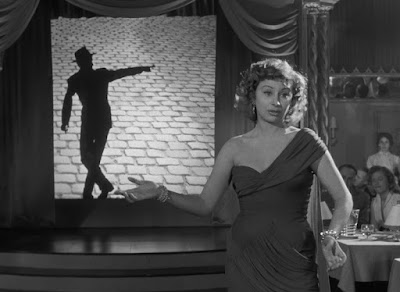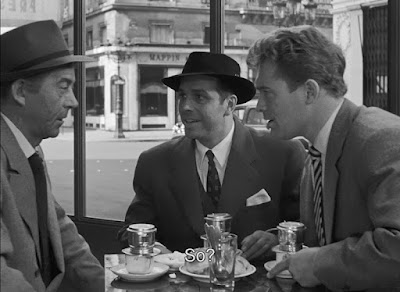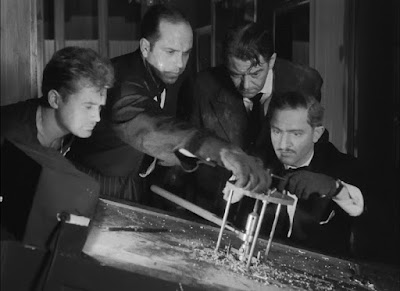(1955) Directed by Jules Dassin; Adapted by Jules Dassin; Based on the novel by Auguste Le Breton; Starring: Jean Servais, Carl Möhner, Robert Manuel, Janine Darcey, Claude Sylvain, Robert Hossein, Marcel Lupovici and Jules Dassin (as Perlo Vita); Available on Blu-ray and DVD
Rating: ****½
“There was a passage in the book that had to do with a
robbery, which was to finance a greater project, and I seized upon that to
build a screenplay around it, and make it a high point in the film. …Many
people asked me why silence, because there’s not a word spoken for a long time,
and I said these are professional guys who work in silence. Noise is an enemy…”
– Jules Dassin
Jules Dassin didn’t invent the heist film, but he perfected it with Rififi (aka: Du Rififi Chez les Hommes), which depicts the perfect crime, only to see everything fall apart. The heist is only the beginning of this noir-drenched* tale, which explores the self-destruction and collateral damage caused by a life of crime. The film’s title (also heard as a jaunty nightclub song, performed by Magali Noël as Viviane) is French slang for a tough guy, or perhaps more accurately, the swagger that goes along with the tough guy persona.** American-born director Jules Dassin, a victim of the blacklist, adapted Auguste Le Breton’s novel,*** providing a counterpoint to the characters’ hyper-masculine exploits.
* Fun Fact #1: In order to create the proper tone, Dassin chose to shoot the film entirely on cloudy days, much to the irritation of the producers.
** CORRECTION: According to my Twitter pal Jean-Paul Audouy (@jpaudouy): "Rififi means “violent fight” and by extension the damages caused by a fight."
*** Fun Fact #2: After reading Dassin’s adaptation, Le Breton
was reportedly displeased, asking the director point-blank, “Where is my book,”
while placing a gun on his desk. Dassin managed to smooth things over with the fiery
tempered writer (who seemed to fashion himself after the hard-boiled characters
in his book), and eventually became friends.
Middle-aged thief Tony le Stéphanois (Jean Servais) is released from prison after serving five-years of his sentence, taking the rap for Jo (Carl Möhner), a younger man. Jail has left its mark on Tony, as evidenced by his chronic cough. Meanwhile, his girlfriend Mado (Marie Sabouret) has left him for another man, shady nightclub owner/kingpin Pierre (Marcel Lupovici). He reconciles the loss in the worst possible way, by taking her jewelry and beating her (thankfully, this is depicted off-screen). Reluctant at first to plunge back into his former life, he ultimately decides to assist Jo and his scheme to knock off the jewelry store Mappin & Webb.* Along with Jo, he joins Mario (Robert Manuel), a flashy-dressing lock picker, and Cesar le Milanais (played by director Dassin, under the pseudonym Perlo Vita), a womanizing safe-cracker. Prefiguring the longer heist sequence, the scene where Cesar cases the jewelry store is wordless. In the scene that follows the thieves meticulously plan every aspect of the impending robbery, timing the nearby traffic, accessing the location in relation to the other businesses, and rehearsing the operation, down to the slightest detail.
* Fun Fact #3: Dassin recalled how the filmmakers didn’t
expect to receive a positive response, when they asked Mappin & Webb if
they would mind being featured in the film. To Dassin’s surprise, they
enthusiastically consented.
Rififi’s claim to fame is indisputably the 30-minute heist sequence, presented from start to finish without dialogue or music.* It’s the antithesis to what we’ve come to expect from directors who would want to fill the space with superfluous chatter (I’ll refrain from naming any names). Instead, we’re left to observe the well-orchestrated operation,** as Tony and company move in synch with each other like an elaborate dance (as if to underscore this imagery, Cesar wears ballet slippers during the heist). As the scene plays out, it becomes evident how speech would be an extraneous distraction. A thick undercurrent of tension fills the void, allowing the audience to focus on the little details of the team’s precision efforts.
* Fun Fact #4: According to Dassin, the film’s composer, Georges Auric, created music for the 30-minute sequence (at the insistence of the producers). After playing the film with and without music, Auric agreed with Dassin that it was better to keep things silent.
** Fun Fact #5: Apparently, Dassin was a little too spot-on
with some of the heist’s details, reportedly spawning a series of copycat robberies
in multiple cities, where Rififi was
shown.
The following scene provides insight into the thieves’ possible
futures, as they sit around a table, surveying the goods. For such a sizable haul
(worth 240 million francs), their dreams are disproportionately mundane. Mario hopes
to spend the money on various hotels, trying out the beds with his wife. In a
similar vein, Cesar plans to continue his womanizing lifestyle. Jo, on the
other hand, wishes to spend his cut on his young son, Tonio (Dominique Maurin),
presumably to shelter him from falling into the same life of crime. Tony, the
most seasoned of the bunch, is unsure about what he will do. He’s grown
accustomed to a life of crime, which has become his trap. For him, there is no
other way of life.
The group’s diminutive dreams, prove to be short-lived, when
Pierre deduces who perpetrated the theft. Their downfall seems almost
pre-ordained, brought on by Cesar’s vanity and Mario’s carelessness. For his
part Jo is blinded by thoughts of making a better life for his son, concluding
that the means justify the ends. He fails to ponder the consequences that affect
his family, when Pierre orders his thugs to kidnap Tonio. Whether he gets his
child back or not, he’s lost in the eyes of his wife, who views him as nothing
but a common criminal who sold out his family.
One of Rififi’s most salient themes is the loss of innocence, personified by Jo’s son. Dressed as a cowboy, he waves his toy gun around, in a playful mimicry of the tough guys on both sides who brandish the real thing. To a group of hardened thieves, it’s serious business, but to a five-year-old, it’s all a big game. At its heart, Rififi is a bleak condemnation of criminal culture – a nowhere road of toxic masculinity and misplaced pride, where stereotypical posturing and misogyny is de rigeur. Rather than glorifying career criminals, it teaches us even the best laid plans eventually lead down a destructive path, from which there is no return and no hope of redemption.








This film does sound interesting, we have a whole load of 70s French comedies added to the streaming over here, all are good fun!
ReplyDeleteThanks for visiting, Gill! It's a classic in every sense of the word, although a bit of a downer. I think a couple of good French comedies would be in order after watching this one. ;)
DeleteIntriguing review, Barry!
ReplyDeleteI've heard of this film but it's never really been on my radar. The photos you chose definitely show some striking visuals.
and I suspect I would relate to the author of the original novel if someone should ever turn one of my books into a motion picture. Lol
It's quite a tense, grim experience (with a jaunty musical number in the middle). Highly recommended.
DeleteAh, there's the rub. I guess that's the old "good news, bad news" thing. Your writing is very cinematic, and would translate to movies well! :)
This looks really good, and I dare anyone to say that title five times fast. ;-)
ReplyDeleteLOL! I'm getting tongue-tied just thinking about it. :)
DeleteIt's a terrific movie. Highly recommended.